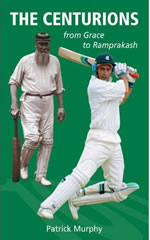The Centurions: From Grace to Ramprakash
David Taylor |Published: 2009
Pages: 320
Author: Murphy, Patrick
Publisher: Fairfield Books
Rating: 4 stars

To be honest it’s not that often that I feel compelled to buy a new book on cricket, but I made an exception when I saw one by Patrick Murphy had been published. Murphy is in my view something of a neglected writer whose 1987 work ‘Fifty Incredible Cricket Matches’ was one of my favourite titles of the 1980s, and when I saw that this had been published by Stephen Chalke’s Fairfield books it was a guarantee of quality for me.
What I didn’t know was that this is an update of a book written in 1982, one which I have to say passed me by at the time. As the title suggests, it’s the story of the twenty-five men (and Murphy is adamant that there’ll be no more) who have attained the Everest of a hundred first-class hundreds. Four have been added since the first publication: Dennis Amiss was added in 1986, and the new book includes Graham Gooch, Graeme Hick and Mark Ramprakash. For some earlier chapters the text has been updated, but not thoughout, and it’s slightly disconcerting to read a phrase like “Denis Compton says …” when you recall that Compton died in 1997. In fact each player’s death is mentioned in his own chapter, but what Murphy has done is talk extensively to players about their contemporaries, something he managed with every one of his subjects except WG Grace. So you get Percy Fender recalling a partnership with Tom Hayward, Alec Bedser talking about Andrew Sandham as a coach, Amiss marvelling at the batting of Colin Cowdrey, and so on, rather than simply interviewing the batsmen themselves (16 of whom were still living in 1982).
These essays, averaging around ten pages or so, are pen pictures rather than straight biographies. In some cases the players’s 100th hundred isn’t even mentioned, though it is when it was an especially memorable occasion, as was the case with Geoff Boycott of course, and also for Glenn Turner (300 in a day against Warwickshire, possibly prompted by a remark from Amiss). If not all the players come alive to the same degree – Hayward and Ernest Tyldesley remain fairly shadowy figures – the book is fairly bursting with facts, memorable quotes and simple, poignant statements. Near the end of his life, Sandham advised his old friend Les Ames not to live to 90. The isolation of men like Turner, Boycott and Walter Hammond is also examined. And “by 1939 Hutton was the best batsman in the world after Bradman. He was just 23. War came at a cruel time.”
If some of the writing borders on eulogy – reading the chapter on Jack Hobbs, for instance, it’s hard to believe the man had a single fault – it’s understandable. Murphy has real affection and admiration for his subjects and it shows in every chapter. He has done them justice here. Highly recommended.






Leave a comment